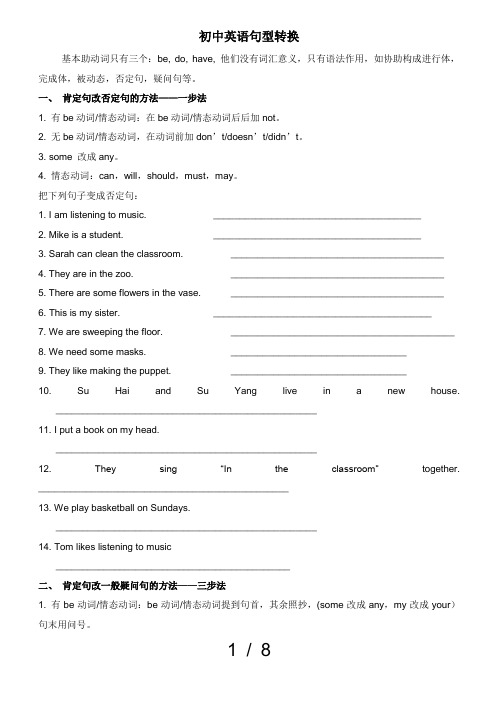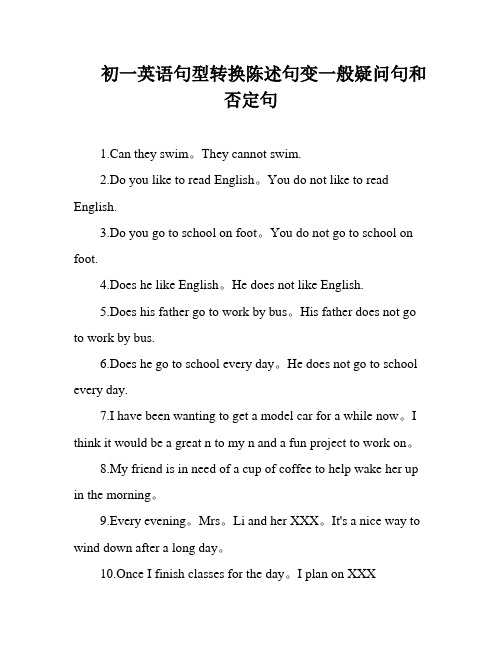初一英语句型转换陈述句变一般疑问句和否定句
初中英语七年级必备整理句型转换陈述句变一般疑问句特殊疑问句及练习

初中英语句型转换基本助动词只有三个:be, do, have, 他们没有词汇意义,只有语法作用,如协助构成进行体,完成体,被动态,否定句,疑问句等。
一、肯定句改否定句的方法——一步法1. 有be动词/情态动词:在be动词/情态动词后后加not。
2. 无be动词/情态动词,在动词前加don’t/doesn’t/didn’t。
3. some 改成any。
4. 情态动词:can,will,should,must,may。
把下列句子变成否定句:1. I am listening to music. _______________________________________2. Mike is a student. _______________________________________3. Sarah can clean the classroom. ________________________________________4. They are in the zoo. ________________________________________5. There are some flowers in the vase. ________________________________________6. This is my sister. _________________________________________7. We are sweeping the floor. __________________________________________8. We need some masks. _________________________________9. They like making the puppet. _________________________________10. Su Hai and Su Yang live in a new house._________________________________________________11. I put a book on my head._________________________________________________12. They sing “In the classroom”together. _______________________________________________13. We play basketball on Sundays._________________________________________________14. Tom likes listening to music____________________________________________二、肯定句改一般疑问句的方法——三步法1. 有be动词/情态动词:be动词/情态动词提到句首,其余照抄,(some改成any,my改成your)句末用问号。
英语所有句型转换的方法(陈述句变否定句一般疑问句特殊疑问句及练习)

英语所有句型转换的⽅法(陈述句变否定句⼀般疑问句特殊疑问句及练习)英语所有句型转换的⽅法基本助动词只有三个:be, do, have, 他们没有词汇意义,只有语法作⽤,如协助构成进⾏体,完成体,被动态,否定句,疑问句等。
⼀、肯定句改否定句的⽅法——⼀步法1、在be动词后加not。
如:is not ,are not ,am not,was not,were not;2、在can,等后加not。
如:cannot3、上述都没有的,在动词前加助动词否定形式do not, does not. (don’t/doesn’t)4、some 改成any。
⼆、肯定句改⼀般疑问句的⽅法——三步法1、把be动词放在句⾸,剩下的照抄,(some 改成any,my改成your等)句点改成问号。
2、把can,等放到句⾸,剩下的照抄,(some 改成any,my改成your等)句点改成问号。
例如:陈述句: They are in the park. He can play the guitar.. ⼀般疑问句: Are they in the park? Can he play the guitar?把下列句⼦变成⼀般疑问句1. I am listening to music._______________________________________2. Mike is a student._______________________________________3. Sarah can clean the classroom.________________________________________4. They are in the zoo.________________________________________5. There are some flowers in the vase.________________________________________6.This is my sister._________________________________________7.We are sweeping the floor.__________________________________________3、上述都没有的,在句⾸请助动词Do/Does帮忙,剩下的照抄,(some 改成any,my改成your等)句点改成问号。
初一英语句型转换陈述句变一般疑问句和否定句

初一英语句型转换陈述句变一般疑问句和否定句1.Can they swim。
They cannot swim.2.Do you like to read English。
You do not like to read English.3.Do you go to school on foot。
You do not go to school on foot.4.Does he like English。
He does not like English.5.Does his father go to work by bus。
His father does not go to work by bus.6.Does he go to school every day。
He does not go to school every day.7.I have been wanting to get a model car for a while now。
I think it would be a great n to my n and a fun project to work on。
8.My friend is in need of a cup of coffee to help wake her up in the morning。
9.Every evening。
Mrs。
Li and her XXX。
It's a nice way to wind down after a long day。
10.Once I finish classes for the day。
I plan on XXX11.Despite being a young boy。
I understand the XXX。
That's why I always make sure to help out with some housework。
初一英语句型转换

初一英语句型转换的专项练习练习一:肯定句变否定句1.He is a student.He is not a student.2.They like playing football.They don't like playing football.3.She can sing a song.She can't sing a song.练习二:陈述句变一般疑问句1.I am from China.Are you from China?2.He has a new bike.Does he have a new bike?3.They are watching TV.Are they watching TV?练习三:划线部分提问1.The book is on the desk. (划线部分为on the desk)Where is the book?2.He is my brother. (划线部分为my brother)Who is he?3.They are five yuan. (划线部分为five yuan)How much are they?— 1 —练习四:同义句转换1.It's time for lunch.It's time to have lunch.2.He is tall and thin.He is a tall and thin man.3.What's your name?May I know your name?以上是一些初一英语句型转换的专项练习,包括肯定句变否定句、陈述句变一般疑问句、划线部分提问和同义句转换等。
通过这些练习,你可以更好地掌握英语句型的变换规律,提高你的英语水平。
记得多做练习,多思考,相信你会越来越擅长英语句型转换的!— 2 —。
七年级英语句式转换30道

七年级英语句式转换30道1. 陈述句:She is a student. 疑问句:Is she a student? 解析:陈述句中有be 动词is,变为一般疑问句时将is 提到句首,句末用问号。
2. 陈述句:They are in the classroom. 疑问句:Are they in the classroom? 解析:陈述句中有be 动词are,变为一般疑问句时将are 提到句首。
3. 陈述句:I am happy. 疑问句:Am I happy? 解析:陈述句中有be 动词am,变为一般疑问句时将am 提到句首,注意第一人称I 变为第二人称you 时,be 动词要用are。
4. 陈述句:He likes apples. 疑问句:Does he like apples? 解析:陈述句中动词likes 是第三人称单数形式,变为一般疑问句时要借助助动词does,likes 变回原形like。
5. 陈述句:We play football on Sundays. 疑问句:Do we play football on Sundays? 解析:陈述句中动词play 是原形,变为一般疑问句时借助助动词do。
6. 陈述句:The dog runs fast. 疑问句:Does the dog run fast? 解析:陈述句中动词runs 是第三人称单数形式,变为一般疑问句时借助助动词does,runs 变回原形run。
7. 陈述句:My father works hard. 疑问句:Does my father work hard? 解析:陈述句中动词works 是第三人称单数形式,变为一般疑问句时借助助动词does,works 变回原形work。
8. 陈述句:She has a pen. 疑问句:Does she have a pen? 解析:陈述句中has 是have 的第三人称单数形式,变为一般疑问句时借助助动词does,has 变回原形have。
初一英语句型转换

初一英语句型转换陈述句变一般疑问句和否定句陈述句变一般疑问句的方法:1.对于助动词、情态动词、be动词作谓语的,把be动词,can,shall,will等放在句首,(some 改成any,my改成your 等),句点改成问号。
如:He's a teacher. →Is he a teacher?He can swim. →Can he swim?He'd like to go there. →Would he like to go there?2.对于实意动词作谓语的,动词原型借助do,三人称单数借助does,过去式借助did,加在句首,再把谓语改为动词原形,(some 改成any,my改成your等),句点改成问号。
如:I like him. →Do I like him?He likes me. →Does he like me?I liked him. →Did I like him?补充:陈述句变特殊疑问句先改一般疑问句,去掉要提问的成分,再在句首加相应疑问词。
如:will go there by bus. Will I go there by bus?二、肯定句变否定句的方法1、在be动词后加not。
如:is not ,are not ,am not,was not,were not;2、在can,should,will等后加not。
如:cannot,should not,will not;3、上述都没有的,在动词前加助动词否定形式don’t/doesn’t/didn’t。
4、some 改成any。
根据句后括号内的要求改写句子陈述句:陈述一件事实的句子,句末用句号。
一般疑问句:对一件不确定的事进行提问,要对方确定。
回答用yes/no,主语+be/情态动词/助动词(谁问谁答)陈述句变一般疑问句的方法:有be(am/is/are)/情态动词(can /may/must…)/助动词的,直接将它提到主语前。
初中英语句型转换(陈述句变一般疑问句特殊疑问句及练习)(20200614091151)
初中英语句型转换一、肯定句改的方法——一步法1. 有be动词(is are am were was)/情态动词(can,could, will, would, shall, should,must,may)的。
在be动词/情态动词后后加not。
2. 无be动词/情态动词,一般现在时在动词前加don’t第三人称单数前doesn't/一般过去式didn’t。
3加doesn't/ did n’t的句子注意,句子动词要变成原型。
二、肯定句改一般疑问句的方法——三步法1. 有be动词/情态动词:be动词/情态动词提到句首,其余照抄,句末用问号。
2. 无be动词/情态动词,在句首加Do/Does/Did,其余照抄,句末用问号。
注意(some改成any,第一人称变为第二人称my改成your , I 改成you,we 改成you,our改成your )3. 加Does、did 的句子注意,句子动词要变成原型。
例如陈述句: They are in the park. He can play the guitar. He likes the dogs.否定句They are not in the park. He can not play the guitar. He doesn't like the dogs一般疑问句: Are they in the park? Can he play the guitar? Does he like the dogs?特殊疑问词的用法意思用法例句who 谁问人的身份,姓名等He is LiLie Who is he ? He is my brother.Who is he ?whom 谁问人的身份,姓名等(问宾语)I can ask him the question. Whom can you ask the question?what 什么问人的职业或事物是什么He is a worker.What is he?He has a book. What does he have ?which 哪一个问一定范围内特指的人或物The big box is mine. Which box is yours? The girl at the door is Ann. Which girl is Ann?whose 谁的问所属关系This is her book.Whose book is this ?This book is hers. Whose is this book? whatcolor什么颜色问颜色(表语)My skirt is red. What color is your skirt?What time 几点问点时间We play games at five in the afternoon ?What time do you play games?when 什么时候问时间We play games in the afternoon ?When do you play games?where 什么地方问地点(状语)We play games at home on Sunday ?Where do you play games on Sunday?why 为什么问原因He isn't at school today because he is ill.Why isn't he at school today ?how 怎样问健康状况、做事的方式等He is fine/strong. How is he ?I go home by bike. How do you go home?how old 多大几岁问年龄He is ten.How old is he ?how many 多少跟复数名词,问数量There are thirty boys in my class.How many boys are there in your class?how much 多少跟不可数名词问数量或价钱There is some milk in the bottle.How much milk is there in the bottle?how far 多远问路程It's five kilometers away from here?How far is it from here?how soon 多久问in+一段时间He can finish it in half an hour.How soon can he finish it ?how long 多久问一段时间,问物体的长短He has lived here for a year. How long has he lived here? The desk is one meters long. How long is the desk ?how often 多久(一次)问频率I go to see my parents once a month.How often do you go to see your parents?How的疑问句辨析一、how many和how much的区别how many用来询问可数名词的数量,它的句式是:How many+复数名词+一般疑问句+?how much用来询问不可数名词的数量,也可询问价格。
初中英语句型转换(陈述句变一般疑问句特殊疑问句及练习)
初中英语句型转换一、 肯定句改的方法——一步法1。
有 be 动词(is are am were was)/情态动词(can,could, will, would, shall, should,must,may)的。
在 be动词/情态动词后后加 not。
2。
无 be 动词/情态动词,一般现在时在动词前加 don’t 第三人称单数前 doesn't/一般过去式 didn't。
3 加 doesn’t/ did n’t 的句子注意,句子动词要变成原型.二、 肯定句改一般疑问句的方法—-三步法1。
有 be 动词/情态动词:be 动词/情态动词提到句首,其余照抄,句末用问号.2. 无 be 动词/情态动词,在句首加 Do/Does/Did,其余照抄,句末用问号。
注意(some 改成 any,第一人称变为第二人称 my 改成 your , I 改成 you,we 改成 you,our 改成 your )3. 加 Does、did 的句子注意,句子动词要变成原型.例如 陈述句: They are in the park.He can play the guitar。
He likes the dogs.否定句 They are not in the park. He can not play the guitar. He doesn’t like the dogs一般疑问句: Are they in the park?Can he play the guitar?Does he like the dogs?特殊疑问词的用法who whom whatwhichwhose what color What time when where whyhow意思 谁 谁什么哪一个谁的 什么颜色用法 问人的身份,姓 名等 问人的身份,姓 名等(问宾语) 问人的职业或 事物是什么问一定范围内 特指的人或物问所属关系问颜色(表语)例句He is LiLieWho is he ?He is my brother。
初一A L2陈述句变一般疑问句_肯定句变否定句
Exercies:
1.You are a student. Are you a student? 2. She is a university student. Is she a university student? 3. He is a principle. Is he a principle? 4. They are good friends. Are they good friends? 5. There is a small bridge in the school. 6. There are many children the park.
1.将 my 变成 your! 2. 将I 变成you, 后be动词也随之变化!
陈述句变一般疑问句 (含be动词) • be提前 • my变your • some变any • .变?
陈述句变否定句 (含be动词)
在be动词后加not, some变成any
Exercise 1 将下列句子变成一般疑问句:
This is my ruler. It is a cat. Is this your ruler? Is it a cat?
Lucy is my daughter. Is Lucy your daughter? My mum is a teacher. Is your mum a teacher? She is Lois. You are a girl. He is my friend. I am 10. Is she Lois?
把陈述句变成一般疑问句
This is your pen pal. Is this your pen pal? Can you play basketball?
I can play basketball.
陈述句变否定句一般疑问句特殊疑问句及练习
句型转换的方法一、肯定句改否定句的方法——一步法1、在be动词后加not。
如:is not , are not , am not, was not, were not;2、在can,should, will等后加not。
如:cannot, should not, will not;3、上述都没有的,在动词前加助动词否定形式don’t/doesn’t/didn’t。
4、 some 改成any。
把下面的句子变成否定句。
1.She is watching TV now.2.We go to school on Sunday.3.His father works hard.4.Jack's mother is a nurse.5.The cat runs fast.6.They like reading books.7.My grandpa gives me a hot dog.8.Tom often walks to school.9.I have a doll.10.It is eating fish.二、肯定句改一般疑问句的方法——三步法1、把be动词放在句首,剩下的照抄,(some 改成any,my改成your等)句点改成问号。
2、把can,shall, will等放到句首,剩下的照抄,(some 改成any,my改成your等)句点改成问号。
例如:陈述句: They are in the park. He can play the guitar..一般疑问句: Are they in the park? Can he play the guitar?把下列句子变成一般疑问句1. I am listening to music.2. Mike is a student.3. Sarah can clean the classroom.4. They are in the zoo.5. There are some flowers in the vase.6.This is my sister.7.We are sweeping the floor.3、上述都没有的,在句首请助动词Do/Does/Did帮忙,剩下的照抄,(some 改成any,my改成your等)句点改成问号。
- 1、下载文档前请自行甄别文档内容的完整性,平台不提供额外的编辑、内容补充、找答案等附加服务。
- 2、"仅部分预览"的文档,不可在线预览部分如存在完整性等问题,可反馈申请退款(可完整预览的文档不适用该条件!)。
- 3、如文档侵犯您的权益,请联系客服反馈,我们会尽快为您处理(人工客服工作时间:9:00-18:30)。
初一英语句型转换
陈述句变一般疑问句和否定句
1 I can help you.
2 Tom’s T-shirt is five dollars.
3 I often watch TV on Sunday.
一、陈述句变一般疑问句的方法:
1.对于助动词、情态动词、be动词作谓语的,把be动词,can,shall, will等放在句首,(some 改成any,my改成your等),句点改成问号。
如:
He's a teacher. →Is he a teacher?
He can swim. →Can he swim?
He'd like to go there. →Would he like to go there?
2.对于实意动词作谓语的,动词原型借助do,三人称单数借助does,过去式借助did,加在句首,再把谓语改为动词原形,(some 改成any,my改成your等),句点改成问号。
如:
I like him. →
Do I like him? Yes,I do /No,I don’t
He likes me. →
Does he like me? Yes,he does No,he doesn’t
I liked him. →
Did I like him? Yes,I did No,I didn’t
I will go there by bus. →
Will I go there by bus? Yes,I will No,I won’t
二、肯定句变否定句的方法
1、在be动词后加not。
如:is not , are not , am not, was not, were not;
2、在can,should, will等后加not。
如:cannot, should not, will not;
3、上述都没有的,在动词前加助动词否定形式don’t/doesn’t/didn’t。
4、 some 改成any。
做题时间:15分钟得分:_________将下列句子分别变换为一般疑问句和否定句。
1 They can swim.
2 I like to read English.
3 I go to school on foot.
4 He likes English.
5 His father goes to work by bus
6 He goes to school every day.
7 I want to have a model car.
8 She wants a cup of coffee.
9 Mrs. Li and Kitty watch television at night.
10 I am going to do my homework after school.
11 The boy does some housework at home.
12 The children had a good time in the park.
13 Jim has some story-books.
14 Mr. Hunt told us something important at the meeting.
15 The old man does morning exercises every morning.
16 I must finish my homework before eight o’clock.
17 He often goes to the library on Sundays.
18 They have a class meeting every week.
19 We are going to see him tomorrow.
20 The story sounds very interesting.。
